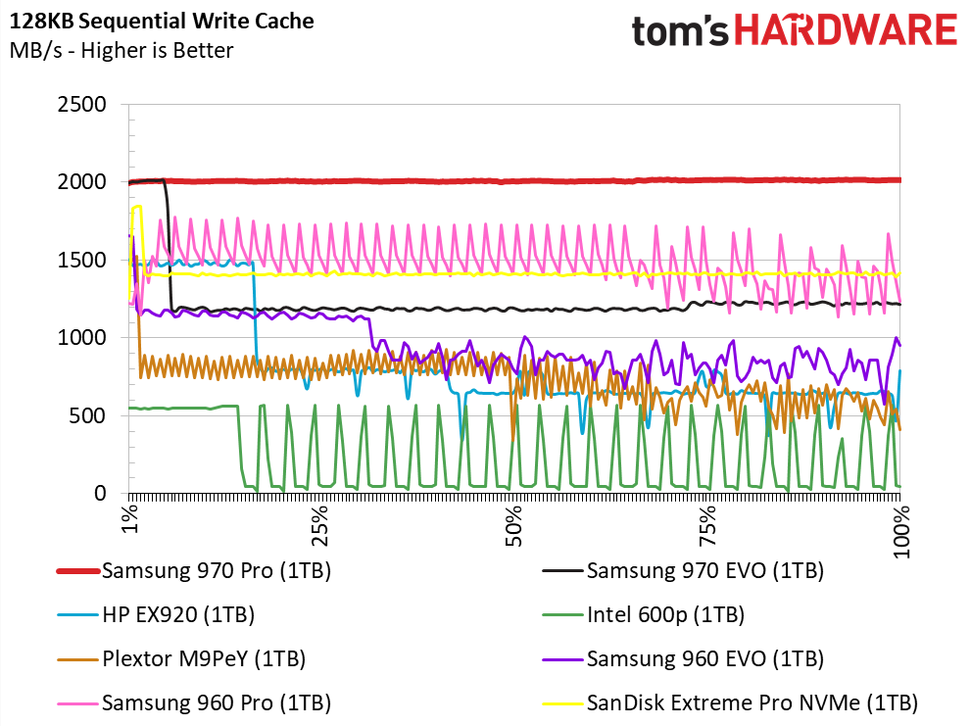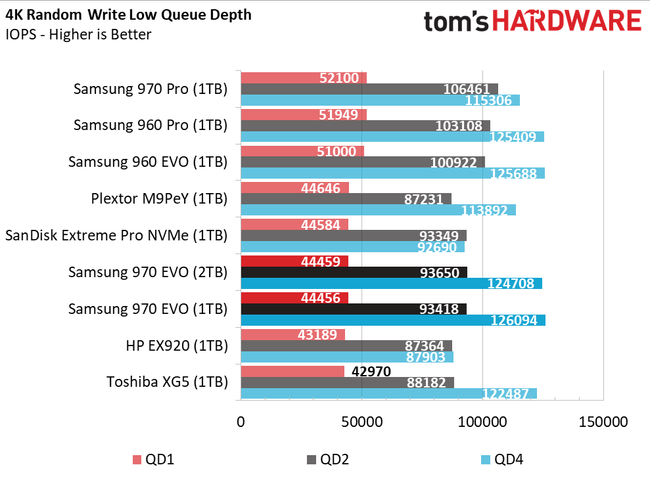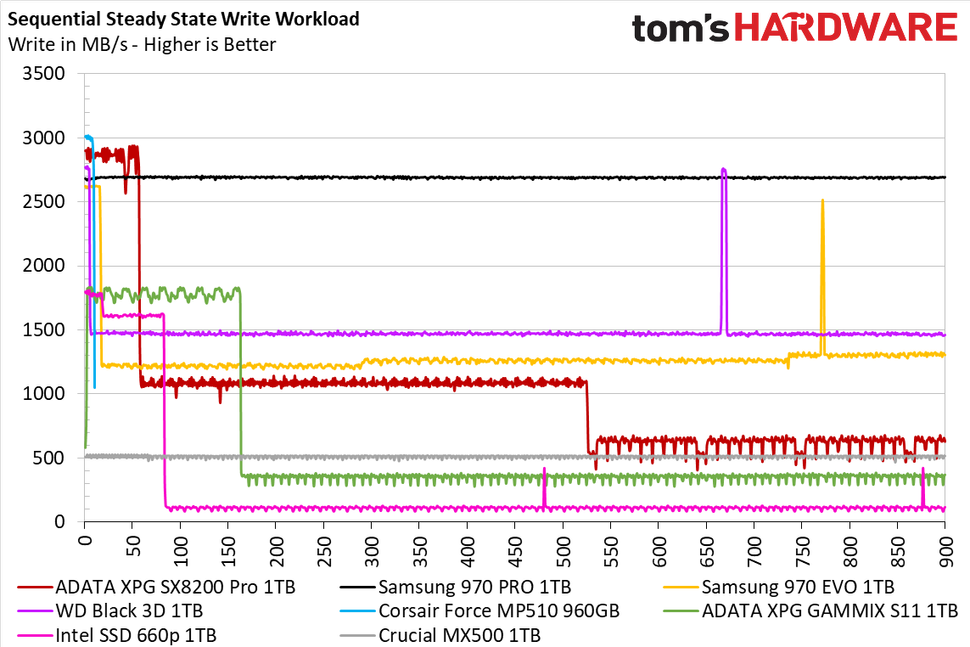Crucial has announced the P5 M.2 NVMe SSD family, which features its fastest drive to .
Crucial Releases Its Fastest SSD Ever in the P5 : Read more
Crucial Releases Its Fastest SSD Ever in the P5 : Read more
No, some are bad even in benchmarks.every NVMe SSD has very nice read/write speeds in benchmarks
Yeah, every NVMe SSD has very nice read/write speeds in benchmarks but when comes to real world than story becomes different.
I have Samsung 970 Pro 1TB and ADATA 8200 Pro 2TB and besides both have nice numbers 970 is faster
Yeah, every NVMe SSD has very nice read/write speeds in benchmarks but when comes to real world than story becomes different.
I have Samsung 970 Pro 1TB and ADATA 8200 Pro 2TB and besides both have nice numbers 970 is faster
The 970 Pro has extremely consistent sequential write speed.I have many workloads where the SX 8200 Pro is faster. Depends on what you are doing. SX8200 Pro is the best value high speed drive. 970 Pro is just a huge waste of money.

the WORST SSD is better than the best spinning rust.No, some are bad even in benchmarks.
Wow you use Defender? I run Kaspersky Internet Security + Malwarebytes and they have zero impact on performance. You have something messed up - I have the same 970 Evo that you have - and have NONE of the performance issues you have.SSD speeds have little effect on OS responsiveness on Windows. Windows Defender (the always-on antivirus) is completely killing the performance of the I/O operations. For example, on my 970 Evo 1TB NVME, I can delete files at about 50 per second, copy small files not much faster. This is absolutely laughable - if the SSD was not saddled by the anti-virus, it would be deleting and copying them at 10,000s if not 100,000s per second.
Of course, everything's fine if copying a few huge files. Gigabytes per second. But that's a niche situation.
The Samsung drives are priced quite fairly and even at $30 to $40 cheaper - most with a clue would still get the Samsung. IF you say this drive is as fast as the Samsung, why in a world that contains Samsung, would you buy this other drive?Numbers similar with 960/970...
Now make it $30-$40 cheaper....and they will come!
Thanks for that, but how many people need to copy 1 TB at a time? Great for drive imaging of another fast NVMe drive, but that's like the only use case I can think of...The 970 Pro has extremely consistent sequential write speed.
Pretty much a solid red line from 0% to 100%
We weren't talking about that, but there are a few cases where even that isn't true.the WORST SSD is better than the best spinning rust.
Let's think about this. I'm pretty sure deleting files is a sequential operation, which means we're looking at QD=1 performance. Deleting each file is going to involve updating directory metadata and filesystem data structures. So, that's a few I/O operations. If you're using a journaling filesystem, add another for writing the journal. So, let's use a round number of 5 I/O ops per file.on my 970 Evo 1TB NVME, I can delete files at about 50 per second, copy small files not much faster. This is absolutely laughable - if the SSD was not saddled by the anti-virus, it would be deleting and copying them at 10,000s if not 100,000s per second.

Okay, then maybe scratch what I said about TRIM.Of course, everything's fine if copying a few huge files. Gigabytes per second. But that's a niche situation.
I'm not so sure it's just your AV. Might be security microcode too for example, depending on your CPU.SSD speeds have little effect on OS responsiveness on Windows. Windows Defender (the always-on antivirus) is completely killing the performance of the I/O operations. For example, on my 970 Evo 1TB NVME, I can delete files at about 50 per second, copy small files not much faster. This is absolutely laughable - if the SSD was not saddled by the anti-virus, it would be deleting and copying them at 10,000s if not 100,000s per second.
Of course, everything's fine if copying a few huge files. Gigabytes per second. But that's a niche situation.
Yeah, what I said about syscall overhead will be much worse with security mitigations. I forgot to account for that.I'm not so sure it's just your AV. Might be security microcode too for example, depending on your CPU.
I agree the 970 Pro is overkill for most people that are not in a write heavy environment.Thanks for that, but how many people need to copy 1 TB at a time? Great for drive imaging of another fast NVMe drive, but that's like the only use case I can think of...
With the 970 EVO, you get maybe 50 GB of full speed writes and then it drops to 50% speed. That would be fine with me.
Most other drives cut out way too quickly, then performance really tanks. The 600p is great for a laugh - it's best speed is like 50% of the 970 EVO's worst. And its worst speed is even slower than a HDD!
No, probably not. In spite of its name, Samsung's "Pro" drives are not their enterprise product line, which likely has some features not found in their consumer models.Do note that the SSDs Tegile uses may not be Samsung 970 Pros, but they could very well be.
The 970 Pro has extremely consistent sequential write speed.
Pretty much a solid red line from 0% to 100%

Depending on the intended use this could be highly advantageous (write cache) or irrelevant (gaming)
Nothing you posted there has anything to do with what I said? I said the SX 8200 Pro is faster in some workloads, you posted a picture without the SX8200 Pro. Go look up the SX8200 Pro review on Tweaktown.
970 | 8200 | |
| Seq Read | 3506 | 3171 MB/s |
| Seq Write | 2719 | 2450 MB/s |
| Random IOPS rd | 354980 | 352050 |
| Random IOPS wr | 272216 | 278320 |
Generally speaking, other slots should be unaffected, other than width or whether they're enabled at all. But speed should be negotiated on a per-device basis.For example, SSD is PCI3, chipset uses PCI4. Is complete chipset downgraded to PCI3 or not?
You said the 970 Pro was "a huge waste of money".Nothing you posted there has anything to do with what I said? I said the SX 8200 Pro is faster in some workloads, you posted a picture without the SX8200 Pro. Go look up the SX8200 Pro review on Tweaktown.

I think you showed that the 970 Pro can be justified in extreme scenarios, but what you posted actually convinced me that the 970 Evo was entirely equivalent, for the vast majority of purposes.You said the 970 Pro was "a huge waste of money".
I provided evidence that under write heavy situations the 970 Pro is not a waste of money.
Yeah? And who needs that?The SX 8200 Pro can't sustain 2800ish megabytes a second of sequential writes for more than 50 gigabytes.
I completely agree.I think you showed that the 970 Pro can be justified in extreme scenarios, but what you posted actually convinced me that the 970 Evo was entirely equivalent, for the vast majority of purposes.
Now, this new chart seems to contract that. I was fine with what I gauged to be about a 50 GB burst capacity, but this chart is showing the Evo throtting at around < 10 GB. That's still good, but just a little close to the kind of file sizes I actually move around.
Yeah? And who needs that?
I'm not saying the 970 Pro isn't excellent, but I think it excels in a realm that most people - even power users - never approach. It's a bit like recommending a 28-core CPU for someone who never uses more than about 8 cores.

